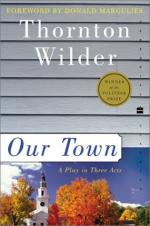|
This section contains 5,304 words (approx. 18 pages at 300 words per page) |

|
SOURCE: Fergusson, Francis. “Three Allegorists: Brecht, Wilder, and Eliot.” In Critical Essays on Thornton Wilder, edited by Martin Blank, pp. 61-71. New York: G. K. Hall & Co., 1996.
In the following essay, originally published in 1956, Fergusson compares the use of allegory by Thornton Wilder, Bertolt Brecht, and T. S. Eliot, focusing especially on Wilder's Our Town and The Skin of Our Teeth.
I
A number of contemporary playwrights, of whom Brecht, Wilder and Eliot are among the most accomplished, are now writing some form of allegory. They reject the tradition of modern realism, perhaps because little remains to be done with direct reflections of contemporary life: the pathos of the lost individual or the decaying suburb has been done to death since Chekhov. They do not seek some form of theater-poetry based on folk forms or myths or rituals, or on symbolism on the analogy of the symboliste poets...
|
This section contains 5,304 words (approx. 18 pages at 300 words per page) |

|


